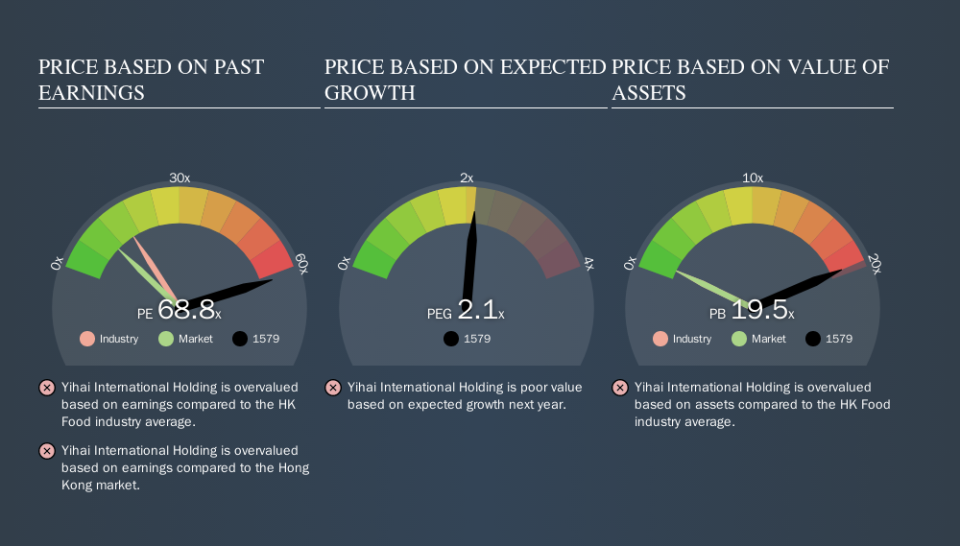Why Yihai International Holding Ltd.'s (HKG:1579) High P/E Ratio Isn't Necessarily A Bad Thing

The goal of this article is to teach you how to use price to earnings ratios (P/E ratios). We'll look at Yihai International Holding Ltd.'s (HKG:1579) P/E ratio and reflect on what it tells us about the company's share price. Yihai International Holding has a P/E ratio of 68.75, based on the last twelve months. That is equivalent to an earnings yield of about 1.5%.
See our latest analysis for Yihai International Holding
How Do I Calculate Yihai International Holding's Price To Earnings Ratio?
The formula for P/E is:
Price to Earnings Ratio = Price per Share (in the reporting currency) ÷ Earnings per Share (EPS)
Or for Yihai International Holding:
P/E of 68.75 = HK$42.79 (Note: this is the share price in the reporting currency, namely, CNY ) ÷ HK$0.62 (Based on the trailing twelve months to June 2019.)
Is A High Price-to-Earnings Ratio Good?
The higher the P/E ratio, the higher the price tag of a business, relative to its trailing earnings. That is not a good or a bad thing per se, but a high P/E does imply buyers are optimistic about the future.
Does Yihai International Holding Have A Relatively High Or Low P/E For Its Industry?
The P/E ratio essentially measures market expectations of a company. You can see in the image below that the average P/E (15.9) for companies in the food industry is a lot lower than Yihai International Holding's P/E.
That means that the market expects Yihai International Holding will outperform other companies in its industry. Clearly the market expects growth, but it isn't guaranteed. So investors should delve deeper. I like to check if company insiders have been buying or selling.
How Growth Rates Impact P/E Ratios
Probably the most important factor in determining what P/E a company trades on is the earnings growth. When earnings grow, the 'E' increases, over time. That means unless the share price increases, the P/E will reduce in a few years. A lower P/E should indicate the stock is cheap relative to others -- and that may attract buyers.
Yihai International Holding's earnings made like a rocket, taking off 61% last year. The cherry on top is that the five year growth rate was an impressive 41% per year. With that kind of growth rate we would generally expect a high P/E ratio.
A Limitation: P/E Ratios Ignore Debt and Cash In The Bank
Don't forget that the P/E ratio considers market capitalization. That means it doesn't take debt or cash into account. Theoretically, a business can improve its earnings (and produce a lower P/E in the future) by investing in growth. That means taking on debt (or spending its cash).
Such expenditure might be good or bad, in the long term, but the point here is that the balance sheet is not reflected by this ratio.
So What Does Yihai International Holding's Balance Sheet Tell Us?
The extra options and safety that comes with Yihai International Holding's CN¥1.2b net cash position means that it deserves a higher P/E than it would if it had a lot of net debt.
The Verdict On Yihai International Holding's P/E Ratio
With a P/E ratio of 68.8, Yihai International Holding is expected to grow earnings very strongly in the years to come. Its net cash position is the cherry on top of its superb EPS growth. To us, this is the sort of company that we would expect to carry an above average price tag (relative to earnings).
Investors should be looking to buy stocks that the market is wrong about. If the reality for a company is better than it expects, you can make money by buying and holding for the long term. So this free visualization of the analyst consensus on future earnings could help you make the right decision about whether to buy, sell, or hold.
But note: Yihai International Holding may not be the best stock to buy. So take a peek at this free list of interesting companies with strong recent earnings growth (and a P/E ratio below 20).
We aim to bring you long-term focused research analysis driven by fundamental data. Note that our analysis may not factor in the latest price-sensitive company announcements or qualitative material.
If you spot an error that warrants correction, please contact the editor at editorial-team@simplywallst.com. This article by Simply Wall St is general in nature. It does not constitute a recommendation to buy or sell any stock, and does not take account of your objectives, or your financial situation. Simply Wall St has no position in the stocks mentioned. Thank you for reading.


